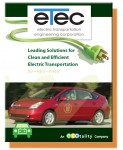 [Original image from Nissan Leaf website]
[Original image from Nissan Leaf website]
With 20,000 reservations in hand, (and with the Autumnal equinox only hours old) Nissan issued a notice Thursday that reservations for their much-anticipated fully electric car, the “Leaf,” had dropped out of reach. Nissan won’t be accepting any more sign-ups for awhile.
The news arrived via E-mail from Nissan USA:
We have completed the first phase of reservations. In order to provide the best level of customer service and premium ownership experience to the first Nissan LEAF drivers, we will not be accepting new reservations until the next phase begins. A subsequent phase of reservations will begin next year, after current reservations and orders have been processed.
This doesn’t mean that 20K Americans have ponied-up anything close to the announced MSRP for the basic model (SV) of $37,720 — just that they had paid a $99 refundable fee. (That MSRP doesn’t include rebates and tax incentives that should bring the net price down to a more modest $25,280, according to Nissan.)
I’ve devoted a lot of column inches (pixels?) covering the Leaf, starting with an August 2009 DOE $2.4 billion grant for Electric Vehicles (EVs) design and production. Part of that money is being used to install 12,000 public EV charging stations as a pilot program in EV infrastructure.
In January 2010, when the Leaf visited Phoenix on a multi-city tour, I went to see the new EV and wrote about the “first look” at the 100-mile/charge vehicle. Later, I test drove the Leaf and described the ride at OnEarth magazine.
Ultimately, the Leaf’s success as an environmentally friendly alternative to gas-powered engines depends on the source of the electricity it uses. If you can generate all its fuel from your own rooftop PV array, or windmill, that’s a clear winner. Otherwise, the equation quickly gets more complex. Whatever the grid is serving in your area is what feeds the Leaf’s battery.
If you live in a state with a Renewable Energy Standard (RES), a portion your local utility’s electricity comes from renewable sources (RESs vary by state. Check the North Carolina Solar Center website, DSIRE, to see if your state has a RES and what it mandates).
If most of your electricity comes from a coal-fired generating plant, trading in a fuel-efficient newer model small car for a Leaf will likely be a net-loss, environmentally speaking. In Phoenix, most of our electricity comes from a nuclear power plant which is not just a low-carbon emitter, but is (I believe) the only nuclear power plant in the country that uses only treated waste water for cooling, which means it has a low water footprint as well. Strictly from a climate perspective, a Leaf seems to be a good idea here.
Of course, nuclear power comes with myriad environmental (and financial and security) debating points, all of which are beyond the scope of this article. The point, however, stands: focusing solely on what powers the vehicle, regardless of how that power is generated, may make us feel good — but it avoids the fundamental realities of how our choices increase or decrease climate change.
Still, EVs like the Nissan Leaf are an important milestone on the path to a sustainable energy future. We just have to keep on going if we are to arrive at our intended destination.
Filed under: All,CO2,Fossil fuels,Laws,Renewables,Solar,Southwest,Wind
Trackback Uri














